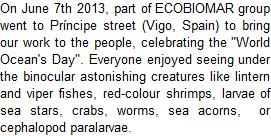LARECO’s productivity is not restricted to scientific papers on mainstream journals or international congresses. The knowledge generated in the project is spread through the different levels of the society, from the youngest to the oldest people. We have gone out of the laboratory to primary and secondary schools, institutes, universities, museums, private foundations and also in the street.
Scientific papers and PhD:
1. Guerra A, González AF, Pascual S, Dawe EG. 2011. An emblematic invertebrate that can represent concern for the conservation of marine biodiversity. Biological Conservation, 144: 1989-1997.
2. Guerra, A. 2012. Studying problems: interdisciplinary approaches to cephalopod biology. Hydrobiologia.
3. Lourenço S, Moreno A, Narciso L, González AF, Pereira J. 2012. Seasonal trends of the reproductive cycle of Octopus vulgaris in two environmentally distinct coastal areas. Fisheries Research, 127: 116-124.
4. Gregori M, Aznar FJ, Abollo E, Roura A, González ÁF, Pascual S. 2012. Nyctiphanes couchii as intermediate host for the acanthocephalan Bolbosoma balaenae in temperate waters off the NE Atlantic. Diseases of Aquatic Organisms, 99: 37-47.
5. Roura A, González AF, Redd K, Guerra A. 2012. Molecular prey identification in wild Octopus vulgaris paralarvae. Marine Biology, 159: 1335-1345.
6. Gregori M, Aznar FJ, Abollo E, Roura A, González ÁF, Pascual S. 2013. Nyctiphanes couchii as intermediate host for Rhadinorhynchus sp. (Acantocephala, Echinorhynchidae) from NW Iberian Peninsula waters. Diseases of Aquatic Organisms, 105: 9-20.
7. Roura A, Álvarez-Salgado XA, González AF, Gregori M, Rosón G, Guerra A. 2013. Short-term meso-scale variability of mesozooplankton communities in a coastal upwelling system (NW Spain). Progress in Oceanography, 109: 18-32.
8. Ecology of planktonic cephalopod paralarvae in coastal upwelling systems. Álvaro Roura PhD. University of Vigo. 2013.
Congress presentations:
1. González A, “Oceanographic impact on the distribution and trophic ecology of wild common octopus paralarvae in a seasonal upwelling area” at the international congress “at the international congress “35th Annual Larval Fish Conference” held in Wilmington (USA) May 22th - 26th 2011.
2. Roura A, “Molecular detection of prey in wild Octopus vulgaris paralarvae” at the international congress “35th Annual Larval Fish Conference” held in Wilmington (USA) May 22th - 26th 2011.
3. Roura A, “Identificación molecular de presas en paralarvas salvajes de Octopus vulgaris” at the “III Simposio Internacional en Ciencias del Mar (ISMS12)“ held in Cádiz (Spain), January 24th - 27th 2012.* Honour mention for best oral presentation.
4. Guerra A, Invited conference: "Studying problems: interdisciplinary approaches to cephalopod biology" at the International congress “Cephalopod International Advisory Council (CIAC12)”, held in Florianópolis (Brazil), October 29th - November 2nd 2012.
5. Lourenço S, "The influence of the trophic habitat on the quality of the gonad of Octopus vulgaris using stable isotopes and lipid class as bio-indicators" at the International congress “Cephalopod International Advisory Council (CIAC12)”, held in Florianópolis (Brazil), October 29th - November 2nd 2012.
6. Roura A, “Cephalopod paralarvae distribution and interactions with mesozooplankton communities in a coastal upwelling system (Ría de Vigo, NW Spain)” at the International congress “Cephalopod International Advisory Council (CIAC12)”, held in Florianópolis (Brazil), October 29th - November 2nd 2012.
7. Roura A, “Distribution of cephalopod paralarvae in two contrasting sites of the Iberian-Canary Current Boundary upwelling system: Cape Silleiro (42ºN) and Cape Ghir (30ºN)” at the International congress “World Congress of Malacology”, held in Ponta Delgada (Azores), July 22th-28th 2013.
Congress posters:
1. Gregori M, "Intermediate hosts for fish parasites in Galician waters" in the "8th International Symposium on Fish Parasites (ISFP8)" held in Viña del Mar (Chile) September 26th - 30th 2011.
2. Roura A, “La comunidad de mesozooplancton asociada con las paralarvas de cefalópodos en el área de afloramiento costero de la Ría de Vigo (noroeste de España)” in the “III Simposio Internacional en Ciencias del Mar (ISMS12)“ held in Cádiz (Spain), January 24th - 27th 2012.
3. Olmos L, “Temporal and spatial distribution of cephalopod paralarvae measured with different sampling gears and sampling strategies" in the “World Congress of Malacology”, held in Ponta Delgada (Azores), July 22th-28th 2013.
LARECO out of the lab:
1. Roura A. Invited researcher for the Scientific Cineforum “20.000 leagues under the sea” held at the Museo del Mar (Alcabre, Spain), November 26th 2011.
2. Roura A. “Cephalopods” to 4 year-old children at the “Villa Laura” nursery (Vigo, Spain) organized by the Spanish National Research Council (CSIC) under the program Exper-i-Ciencia 2012.
3. Roura A, Invited researcher for the Scientific Cineforum “Finding Nemo” held At the Fundación Barrié (Vigo, Spain), September 21st 2012
4. Guerra A. Invited conference. ¿Por qué hay tantos calamares gigantes en Asturias? Primeras jornadas en «Calamares en Luarca. Ciencia y Gastronomía». September 30th 2012.
5. González AF. Invited conference. Influence of climate on cephalopods. Primeras jornadas en «Calamares en Luarca. Ciencia y Gastronomía». September 30th 2012.
6. Roura A. “The secrets of the common octopus” to three courses of 11-year-old at the “Humberto Juanes” school (Nigrán, Spain) organized by the Spanish National Research Council (CSIC) under the program Exper-i-Ciencia 2012.
7. Roura A. “Octopus vulgaris hidden secrets” to 14-16 year-old at the “IES Alexandre Bóveda” high school (Vigo, Spain) under the program EducaBarrié 2012.
8. Roura A. “Octopus vulgaris hidden secrets” to 15 year-old at the Fundación Barrié, (Vigo, Spain) under the program EducaBarrié 2012.
9. Roura A. “The secrets of common octopus paralarvae” to three courses of 11-year-old at the “Humberto Juanes” school (Nigrán, Spain) organized by the Spanish National Research Council (CSIC) under the program Exper-i-Ciencia 2013.
10. Roura A. “What can we found in a drop of water?” to nine courses from 8 to 11-year-old at the CEIP 6 do Nadal, Vigo, organized by the Spanish National Research Council (CSIC) under the program Exper-i-Ciencia 2013.
11. Roura A. “The secrets of common octopus paralarvae” to twelve courses from 8 to 11-year-old at the CPI de Panxón, Vigo, organized by the Spanish National Research Council (CSIC) under the program Exper-i-Ciencia 2013.
12. Roura A. Participation in “World Ocean’s Day” held in Príncipe Street, Vigo 7th June 2013.
13. Roura A. “Ecología de paralarvas de cefalópodos en áreas de afloramiento costero: Aplicación de herramientas de análisis de ADN” at the University of Alicante, June 21th 2013.
14. Roura A. Scientific tale “Non quero ser un polbo” held at the Marine Research Institute, within the activities of Science's week 2013, 16-11-2013.
15. Roura A. Talk at the highschool “IES do Castro” (Vigo) named “Los secretos de las larvas de pulpo”, within the activiteis of the 20th aniversary of the highschool, 19-12-2013.
16. Roura A. Organizer of the scientific workshop “Qué hay en una gota de agua”, held within the activities of Science's week in “O Castro International British School”, 08-02-2014.


